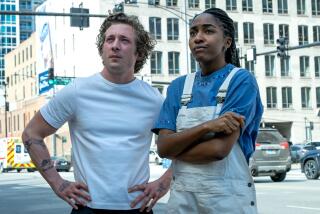Rowan Atkinson talks up 25 years of Mr. Bean’s clownish chaos
It has been 25 years since Rowan Atkinson, CBE, brought the quietly calamitous “Mr. Bean” to television, an anniversary that has been celebrated with “The Whole Bean: Remastered,” a video collection released this week by Shout! Factory.
It includes all 14 episodes — seven brief but glorious hours — of the two-season series, along with the customary documentary condiments and unseen extras.
I find Bean extraordinarily funny. You might resist him at first, might easily mistake him with his funny face and flappy arms, his plain suits and deceptively Everyman air, for someone more adorable than he is.
On the face of it, he is miles away from Atkinson’s previous TV character, the heroically villainous Blackadder, contained, controlled, verbally cutting. And yet each in his way is a schemer, driven by desire and untroubled by guilt or shame.
“There are moments of sentimentality in ‘Bean,’ ” Atkinson said recently by phone from England, “but normally it’s undermined pretty rapidly by his outrageously self-centered and self-regarding behavior. I certainly always enjoyed the vindictive side of Bean, and I think it’s interesting to have your cake and eat it — I think sometimes he can be rather sweet, as children can, and sometimes he can be extremely unpleasant, as children can. He covers the child spectrum, I think, quite well.”
The kind of comedy offered here by Atkinson and Bean co-creator Richard Curtis (elsewhere the author of “Four Weddings and a Funeral” and “Love Actually”) is way out on the margins by contemporary standards. Its deliberate pace, its methodical progress from premise to predicament to payoff, its careful working out of theme and variations, its clownish chaos, are not the stuff of modern humor.
Instead, it’s a throwback to the silent films of Keaton and Chaplin, especially, to the French director and actor Jacques Tati, whose barely verbal “Mr. Hulot’s Holiday” changed Atkinson’s life when he first encountered it as a teenager.
Atkinson has described “Mr. Bean” as “broad, simple, accessible stuff,” and yet it also makes you work a little. You have to pay attention, to go all in, to surrender to it in a way that we are not used to in these distracted times. It feels kind of marvelous to adjust yourself to its peculiar clock.
Although he had acted in plays at school, it wasn’t until Oxford, as a graduate student in electrical engineering, that he “really registered my face, believe it or not, as a means of comedy expression. That was when the physicality developed. I found that I could kick very high and I could bend my knees in a comedy way, and I thought that’s fun, I’ll do that a bit.”
Bean, says Atkinson, “just sort of happened. Richard Curtis and I were at university together, and it was when we were preparing a show for the Edinburgh Festival Fringe in 1979, he said, ‘Why don’t we try something visual?’ because he knew I was interested in purely visual comedy and he was just a bit bored with writing words and wanted to concoct something else; so he came up with this idea of a man who can’t stay awake.”
That became the first sketch of the first “Mr. Bean” episode, a decade later.
More intentionally, “Mr. Bean” grew out of a trip Atkinson took to Venice, Italy, in 1984, where he saw Norwegian tourists buying CDs of the British band Duran Duran. “I remember feeling the frustration of the parochial nature of comedy and thinking how nice it would be if one could break that tradition and find something that was of genuine international appeal.”
Atkinson and Curtis expected that the series “would be watched by a very small audience at 3 o’clock in the morning. But entirely by chance we happened to get a slot at 8 o’clock in peak time on ITV, the prime commercial terrestrial channel in Britain.” It became a national, then, indeed, a worldwide, sensation.
And though it wasn’t intended for children, it was embraced by them. “They turned out to be probably the most enthusiastic sector, simply because Bean is a child trapped in a man’s body, with all the selfishness and vindictiveness and potential nastiness of a child. That’s probably the key to his success.”
Mr. Bean went on to star in two films, “Bean” (1997), which saw him in Los Angeles, and the French-set “Mr. Bean’s Holiday” (2007), its title a nod to Tati.
“I am getting older, and he naturally has to get older with me,” said Atkinson, now 60, “and that’s why I’ve done him very little in recent years. Because I don’t particularly want him to get old. I’ve always seen him as a rather timeless, ageless figure — though, in fact, when we were doing this funeral sketch a few weeks ago, quite a few people said you know there’s something about Bean in middle age which feels almost more right; he sort of suits an older outlook. We could possibly make a movie one day named ‘Old Bean’ and consciously create an old Bean, who’s like Bean but really doddery, and I think one could confront the age issue head-on.”
Still, Bean recurs. Notably and globally, he appeared in the opening ceremonies for the 2012 London Olympics as a bored keyboard player dreaming himself into a “Chariots of Fire” sequence (in which, typically, he cheated).
When I spoke with Atkinson, he and Curtis had just shot a new “Bean” sketch, set at a funeral, for a Comic Relief show. (Curtis is a co-founder of the charity.) And Atkinson, whose next project will be to play Georges Simenon’s Inspector Maigret in a pair of movies for ITV, is currently working on a new batch of Mr. Bean animated cartoons — 52 earlier episodes originally aired from 2002 to 2004 — in which he’s finding new notes to play.
Funnily enough, they are verbal ones.
“I’ve really been enjoying voicing the animated series, because the character has changed subtly again,” Atkinson said. “I can’t say why or how exactly, except that he’s talking more than he used to. I’m really enjoying his vocabulary.”
MORE FROM ENTERTAINMENT:
‘Mad Men’s’ final premiere event is a grand affair
PBS’ ‘Cancer’ an epic, vital story Ken Burns just couldn’t refuse
Julie Andrews on ‘The Sound of Music,’ film, fame and Lady Gaga
More to Read
The complete guide to home viewing
Get Screen Gab for everything about the TV shows and streaming movies everyone’s talking about.
You may occasionally receive promotional content from the Los Angeles Times.







